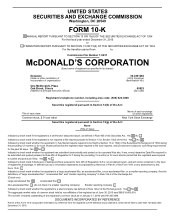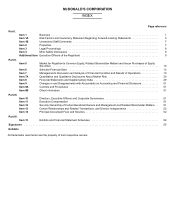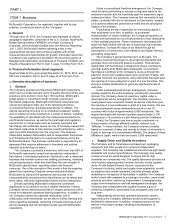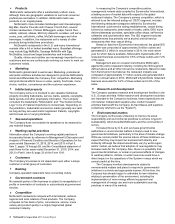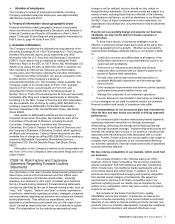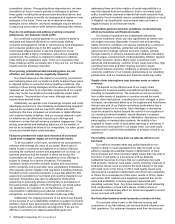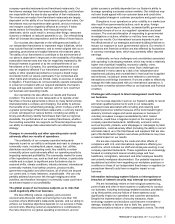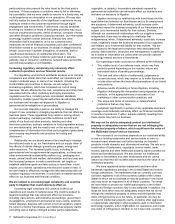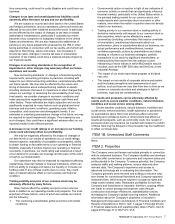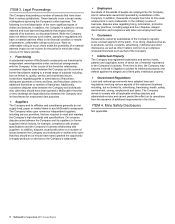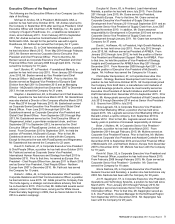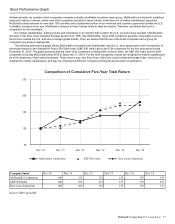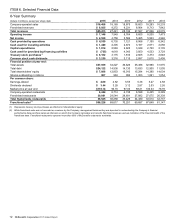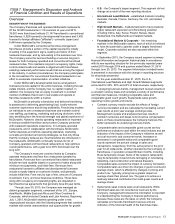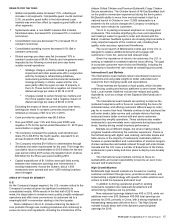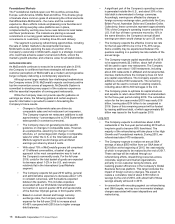McDonalds 2015 Annual Report Download - page 8
Download and view the complete annual report
Please find page 8 of the 2015 McDonalds annual report below. You can navigate through the pages in the report by either clicking on the pages listed below, or by using the keyword search tool below to find specific information within the annual report.
6 McDonald's Corporation 2015 Annual Report
party solutions also present the risks faced by the third party’s
business. If those systems or solutions were to fail or otherwise
be unavailable, and we were unable to recover in a timely way, we
could experience an interruption in our operations. We may also
not fully realize the benefits of the significant investments we are
making to enhance the customer experience through digital
engagement and social media. Furthermore, security breaches
involving our systems or those of third party providers may occur,
such as unauthorized access, denial of service, computer viruses
and other disruptive problems caused by hackers. Our information
technology systems contain personal, financial and other
information that is entrusted to us by our customers and
employees as well as financial, proprietary and other confidential
information related to our business. An actual or alleged security
breach could result in system disruptions, shutdowns, theft or
unauthorized disclosure of confidential information. The
occurrence of any of these incidents could result in adverse
publicity, loss of consumer confidence, reduced sales and profits,
and criminal penalties or civil liabilities.
Increasing regulatory complexity may adversely affect
restaurant operations and our financial results.
Our regulatory environment worldwide exposes us to complex
compliance and similar risks that could affect our operations and
results in material ways. In many of our markets, including the
United States and countries in Europe, we are subject to
increasing regulation, which has increased our cost of doing
business. We are affected by the cost, compliance and other risks
associated with the often conflicting and highly prescriptive
regulations we face, including where inconsistent standards
imposed by multiple governmental authorities can adversely affect
our business and increase our exposure to litigation or
governmental investigations or proceedings.
Our success depends in part on our ability to manage the
impact of new, potential or changing regulations that can affect our
business plans. These regulations may relate to, among others,
product packaging, marketing and the nutritional content and
safety of our food and other products, labeling and other
disclosure practices, ordinary variations in food preparation among
our own restaurants, and the need to rely on the accuracy and
completeness of information from third-party suppliers (particularly
given varying requirements and practices for testing and
disclosure).
Additionally, we are keenly aware of and working to manage
the risks and costs to us, our franchisees and our supply chain of
the effects of climate change, greenhouse gases, energy and
water resources. The increased public focus, including by
governmental and nongovernmental organizations, on these and
other environmental sustainability matters (e.g., packaging and
waste, animal health and welfare, deforestation and land use) and
the increased pressure to make commitments, set targets or
establish additional goals and take actions to meet them, could
expose us to market, operational and execution costs or risks. If
we are unable to effectively manage the risks associated with our
complex regulatory environment, it could have a material adverse
effect on our business and financial condition.
We are subject to increasing legal complexity and could be
party to litigation that could adversely affect us.
Increasing legal complexity will continue to affect our
operations and results in material ways. We could be subject to
legal proceedings that may adversely affect our business,
including class actions, administrative proceedings, government
investigations, employment and personal injury claims, landlord/
tenant disputes, disputes with current or former suppliers, claims
by current or former franchisees, and intellectual property claims
(including claims that we infringed another party’s trademarks,
copyrights, or patents). Inconsistent standards imposed by
governmental authorities can adversely affect our business and
increase our exposure to litigation.
Litigation involving our relationship with franchisees and the
legal distinction between our franchisees and us for employment
law purposes, if determined adversely, could increase costs,
negatively impact the business prospects of our franchisees and
subject us to incremental liability for their actions. Similarly,
although our commercial relationships with our suppliers remain
independent, there may be attempts to challenge that
independence, which, if determined adversely, could also increase
costs, negatively impact the business prospects of our suppliers,
and subject us to incremental liability for their actions. We are
also subject to the legal and compliance risks associated with
privacy, data collection, protection and management, in particular
as it relates to information we collect when we provide optional
technology-related services to franchisees.
Our operating results could also be affected by the following:
The relative level of our defense costs, which vary from
period to period depending on the number, nature and
procedural status of pending proceedings;
The cost and other effects of settlements, judgments or
consent decrees, which may require us to make disclosures
or take other actions that may affect perceptions of our brand
and products;
Adverse results of pending or future litigation, including
litigation challenging the composition and preparation of our
products, or the appropriateness or accuracy of our
marketing or other communication practices; and
The scope and terms of insurance or indemnification
protections that we may have.
A judgment significantly in excess of any applicable insurance
coverage could materially adversely affect our financial condition
or results of operations. Further, adverse publicity resulting from
these claims may hurt our business.
We may not be able to adequately protect our intellectual
property or adequately ensure that we are not infringing the
intellectual property of others, which could harm the value of
the McDonald’s brand and our business.
The success of our business depends on our continued ability
to use our existing trademarks and service marks in order to
increase brand awareness and further develop our branded
products in both domestic and international markets. We rely on a
combination of trademarks, copyrights, service marks, trade
secrets, patents and other intellectual property rights to protect our
brand and branded products. We also license our intellectual
property to franchisees and other third parties and we cannot
assure you that they will not take actions that hurt the value of our
intellectual property.
We have registered certain trademarks and have other
trademark registrations pending in the United States and certain
foreign jurisdictions. The trademarks that we currently use have
not been registered in all of the countries outside of the United
States in which we do business or may do business in the future
and may never be registered in all of these countries. The steps
we have taken to protect our intellectual property in the United
States and foreign countries may not be adequate. In addition, the
steps we have taken may not adequately ensure that we do not
infringe the intellectual property of others and third parties may
claim infringement by us in the future. In particular, we may be
involved in intellectual property claims, including often aggressive
or opportunistic attempts to enforce patents used in information
technology systems, which might affect our operations and results.
Any claim of infringement, whether or not it has merit, could be

